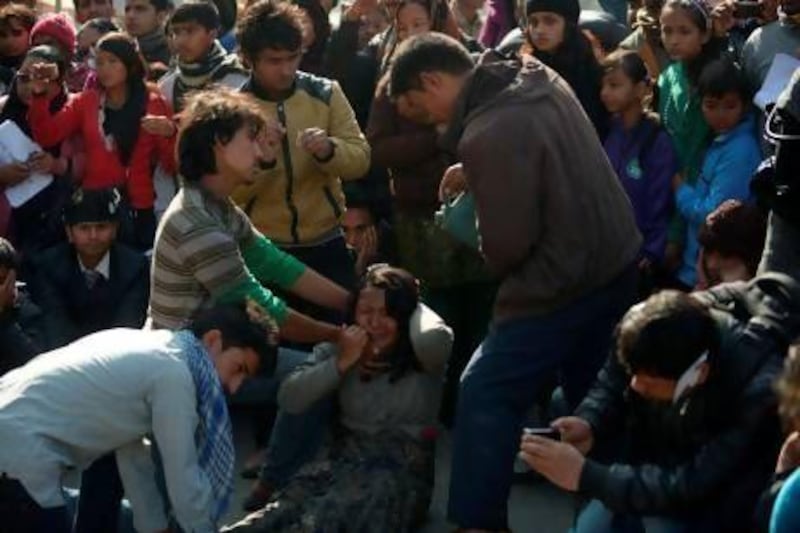LONDON // The father of an Indian woman whose brutal rape and torture provoked a global outcry said in an interview published yesterday that he wanted her name to be made public.
He said he wanted her to be an inspiration to other victims of sexual assault - and his call was quickly taken up by social media users and may pressure authorities to allow her identity to be revealed.
The 23-year-old physiotherapy student died on December 29 in a Singapore hospital, two weeks after a gang rape on a moving bus in New Delhi that ignited protests across India and neighbouring countries, and prompted government promises for tougher punishments for offenders.
"We want the world to know her real name," the woman's father told Britain's Sunday People newspaper.
"My daughter didn't do anything wrong, she died while protecting herself," he added.
"I am proud of her. Revealing her name will give courage to other women who have survived these attacks. They will find strength from my daughter."
Indian law generally prohibits the identification of victims of sex crimes.
The law is intended to protect victims' privacy and keep them from the media glare in a country where the social stigma associated with rape can be devastating.
The father later said he had no objections to the media using his daughter's name, but did not elaborate.
The father's interview sparked widespread interest on social networking sites. Her name was the top trending topic among Indian Twitter users with many, including journalists and Bollywood actors, praising his decision to reveal her name. Mainstream Indian media did not identify her, however, and she was still being referred to as "Amanat", an Urdu word meaning "treasure", by some televsion channels.
There have been growing calls in India to name the victim. Parliament member Shashi Tharoor last week questioned the merit of keeping her anonymous, and suggested naming new anti-rape legislation after her, a proposal that her father supported.
The British paper named the father and his daughter, saying that the father had given permission, but added that it would not publish a photo of her at the family's request.
Citing the same law, Delhi police have started legal proceedings against TV network Zee News after it ran an interview with a friend of the victim who was with her during the attack.
He accused the police of responding slowly and failing to cover the victim and himself after they were thrown from the bus without clothes and bleeding.
Five men have been charged with her gang rape and murder and will appear in a New Delhi court today.
Despite huge public pressure to move quickly, it might take several weeks to formally begin the trial against the five men, a public prosecutor in the case, Rajiv Mohan, said. He added the case could be concluded within four to five months.
A juvenile also accused of the assault will be tried separately.
The protests and fierce public debate that followed the December 16 rape have revealed fissures between conservative Indians - who blame a wave of sex crimes on a loss of traditional values - and a growing new middle class used to women playing a larger role in public life.
The head of a Hindu nationalist organisation linked to the main opposition force, the Bharatiya Janata Party, on Friday stoked debate by saying sex crimes and gang rapes mainly happened in urban India - a position not supported by facts.
"You go to villages and forests of the country and there will be no such incidents of gang rape or sex crimes," said Mohan Bhagwat, the head of the Rashtriya Swayamsevak Sangh (RSS) a right-wing nationalist group.
"They are prevalent in some urban belts."
While India's per-capita rape statistics are lower than in many other nations, one rape case is reported in the country every 20 minutes.
A global poll of experts last year by TrustLaw, a legal news service run by Thomson Reuters Foundation, showed India to be the worst place among G20 countries to be a woman.
Activists say most sex crimes in India go unreported, and official data show that almost all go unpunished. Reported rape cases rose nearly 17 per cent between 2007 and 2011.





